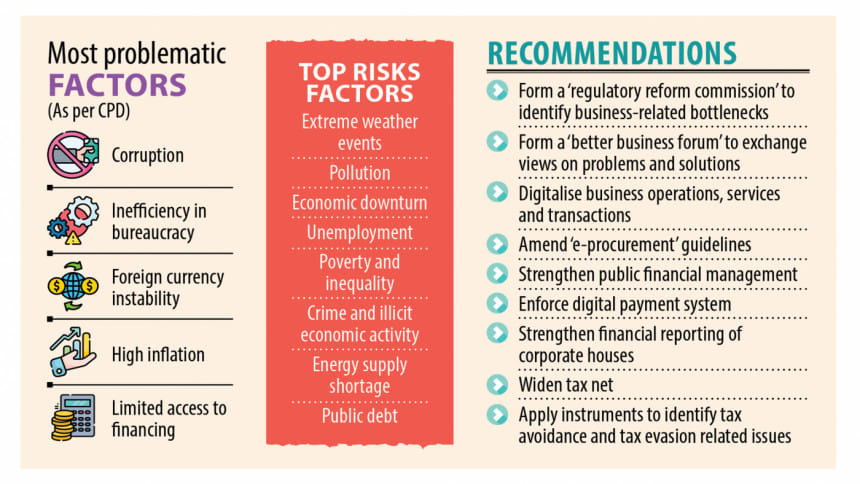Graft biggest obstacle to doing business

More than 16 percent of Bangladeshi businesses identified corruption as the biggest obstacle to their operations, according to a survey conducted between April and July of this year.
"Corruption, faced by businesses regardless of size, remains the main obstacle to doing business in Bangladesh," said Khondaker Golam Moazzem, research director of local think tank Centre for Policy Dialogue (CPD), which conducted the study.
While presenting the findings at a dialogue at BRAC Centre Inn in Dhaka yesterday, he said foreign currency instability, inefficient bureaucracy, inflation and limited access to financing are other top hindrances to doing business in Bangladesh.
"During the tenure of the previous regime, Bangladesh's overall business environment saw limited progress as business activities remained concentrated within a few dominant groups," Moazzem said.
The dialogue, titled "Reform in Bangladesh's Business Environment and Business Processes: Agenda for the Interim Government," also highlighted several other issues facing businesses, such as inadequate infrastructure, poor public health, crime and theft and lack of work ethic among the labour force.
At the event, Fazlee Shamim Ehsan, executive president of the Bangladesh Knitwear Manufacturers and Exporters Association (BKMEA), said corruption was the mother of all their problems.
Sharing his bitter experiences with graft, the top BKMEA leader said they must often pay bribes to get work done, which causes Tk 20 to Tk 25 lakh to vanish annually from their company books with no traceable evidence.
As a result, bribes must be paid again when filing taxes to cover up accounting mismatches, he added.
"Curbing corruption should be the top priority among ongoing reform initiatives," Ehsan stressed.
Remove red tape to improve ease of business
Business leaders also discussed how bureaucratic red tape, which was identified as one of the major business obstacles, is costing entrepreneurs.
AKM Fahim Masroor, former president of the Bangladesh Association of Software and Information Services, said the cost of business entry is much higher than the cost of doing business, mainly due to red tape.
"Availing almost 30 types of licences and completing related formalities has become a major headache for young entrepreneurs," he said.
While navigating these barriers, it becomes difficult for new entrepreneurs to decide whether to comply or continue the business, he said.
Other speakers at the event also shared similar experiences regarding red tape delaying businesses.
For instance, fast-moving consumer goods giant Unilever Bangladesh needed 30 months for the simple task of land acquisition, according to its Chairman and Managing Director Zaved Akhtar.
Akhtar, also the president of the Foreign Investors' Chamber of Commerce and Industry, called for policy continuity and eliminating red tape.
He also called to reduce the effective tax rate and restore law and order immediately.
Ashraf Ahmed, president of the Dhaka Chamber of Commerce and Industry (DCCI), said automation can be an effective solution to minimising the cost of doing business and rooting out corruption.
Businessmen critical of BB role in ailing banks, inflation
The CPD survey also flagged inflation as a major risk factor for the economy over the next two years.
Former FBCCI President Abdul Awal Mintoo criticised the central bank's approach of adopting a contractionary monetary policy to cool off stubbornly high inflation.
He said there are nearly 18 factors that can cause inflation to go up.
"If the central bank undertakes the responsibility to tame inflation through the monetary policy alone, they are living in a fool's paradise."
Mintoo also criticised the proposal to close weak banks and asked economists and business leaders to refrain from making wholesale comments on such topics.
"I established a bank that became one of the top banks in the country in 2008. Now, it has become the worst bank," added Mintoo, currently chairman of the National Bank.
He instead questioned why the situation of the banks had deteriorated, who did it and who allowed it.
"The central bank distorted commercial banks and has become the most dictatorial institution in Bangladesh," Mintoo commented, calling for restructuring of the central bank immediately to end its "dictatorial approach".
Offering a different perspective, DCCI President Ahmed said, "When a bank faces bankruptcy, why are you allowing it to flounder? If a bank becomes bankrupt, it should die."
"Call it bankrupt and let it die."
Can this govt deliver the full reform tonic?
CPD Research Director Moazzem said the absence of substantial reforms in policies, laws, institutions and operations hinders the development of a participatory and competitive business environment.
The paper said that businesses faced prolonged uncertainty during the student-led protests against the previous regime, with its impacts persisting even after the country transitioned into a new phase.
Lutfey Siddiqi, the chief adviser's special envoy for international affairs, said the government needs to further improve its efforts to enhance the ease of doing business.
"But there is also a nexus -- a devil's pact -- among a small number of large businesses that do not want business processes to become easier since they have figured out shortcuts," he said.
According to business leader Mintoo, reform is a continuous process and businesspeople should not expect all reforms to be implemented by this interim government.
"If we really want reforms to get a better country, the first reform should be in politics," he said.
He added that the country's political scene has been criminalised over the past 20 to 30 years. Criminalised politics has been created for vested interest groups in every sector like power, energy and banking.
Mintoo added that there are two groups in society: one creating money and wealth, and another looting the money.
Bida shares reform plans
Chowdhury Ashik Mahmud Bin Harun, the executive chairman of the Bangladesh Investment Development Authority (Bida), the country's apex investment promotion agency, said the current Bida office sometimes functions like a "post office", with many checkpoints that obstruct progress.
He shared plans to redesign the institution into a streamlined, customer-centric model, akin to an "Apple store".
Under this model, he said investors will be greeted by customer relationship managers upon entry, who will guide them and provide necessary services.
He said that officials from the National Board of Revenue, the Ministry of Environment, and other government agencies will possibly need to be co-located at Bida to ensure smooth and efficient service delivery.
According to the CPD survey, some of the business indicators, including reliance on professional management, inclusive workforce and recruitment and termination practices, were found to be improving and positive.
Most of these improvements came from the private sector.
On the other hand, major indicators where performance declined included judicial independence and the quality of tertiary education.

 For all latest news, follow The Daily Star's Google News channel.
For all latest news, follow The Daily Star's Google News channel. 








Comments